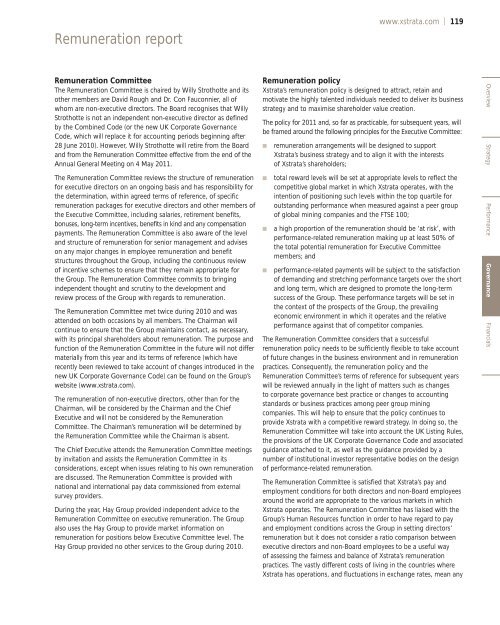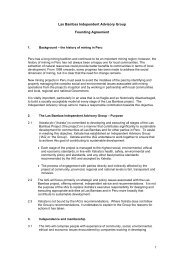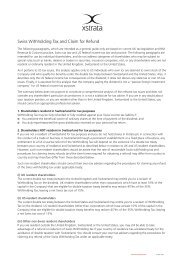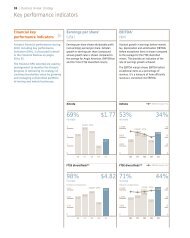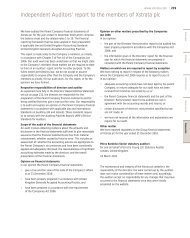Governance - Xstrata
Governance - Xstrata
Governance - Xstrata
You also want an ePaper? Increase the reach of your titles
YUMPU automatically turns print PDFs into web optimized ePapers that Google loves.
Remuneration report<br />
Remuneration Committee<br />
The Remuneration Committee is chaired by Willy Strothotte and its<br />
other members are David Rough and Dr. Con Fauconnier, all of<br />
whom are non-executive directors. The Board recognises that Willy<br />
Strothotte is not an independent non-executive director as defined<br />
by the Combined Code (or the new UK Corporate <strong>Governance</strong><br />
Code, which will replace it for accounting periods beginning after<br />
28 June 2010). However, Willy Strothotte will retire from the Board<br />
and from the Remuneration Committee effective from the end of the<br />
Annual General Meeting on 4 May 2011.<br />
The Remuneration Committee reviews the structure of remuneration<br />
for executive directors on an ongoing basis and has responsibility for<br />
the determination, within agreed terms of reference, of specific<br />
remuneration packages for executive directors and other members of<br />
the Executive Committee, including salaries, retirement benefits,<br />
bonuses, long-term incentives, benefits in kind and any compensation<br />
payments. The Remuneration Committee is also aware of the level<br />
and structure of remuneration for senior management and advises<br />
on any major changes in employee remuneration and benefit<br />
structures throughout the Group, including the continuous review<br />
of incentive schemes to ensure that they remain appropriate for<br />
the Group. The Remuneration Committee commits to bringing<br />
independent thought and scrutiny to the development and<br />
review process of the Group with regards to remuneration.<br />
The Remuneration Committee met twice during 2010 and was<br />
attended on both occasions by all members. The Chairman will<br />
continue to ensure that the Group maintains contact, as necessary,<br />
with its principal shareholders about remuneration. The purpose and<br />
function of the Remuneration Committee in the future will not differ<br />
materially from this year and its terms of reference (which have<br />
recently been reviewed to take account of changes introduced in the<br />
new UK Corporate <strong>Governance</strong> Code) can be found on the Group’s<br />
website (www.xstrata.com).<br />
The remuneration of non-executive directors, other than for the<br />
Chairman, will be considered by the Chairman and the Chief<br />
Executive and will not be considered by the Remuneration<br />
Committee. The Chairman’s remuneration will be determined by<br />
the Remuneration Committee while the Chairman is absent.<br />
The Chief Executive attends the Remuneration Committee meetings<br />
by invitation and assists the Remuneration Committee in its<br />
considerations, except when issues relating to his own remuneration<br />
are discussed. The Remuneration Committee is provided with<br />
national and international pay data commissioned from external<br />
survey providers.<br />
During the year, Hay Group provided independent advice to the<br />
Remuneration Committee on executive remuneration. The Group<br />
also uses the Hay Group to provide market information on<br />
remuneration for positions below Executive Committee level. The<br />
Hay Group provided no other services to the Group during 2010.<br />
www.xstrata.com | 119<br />
Remuneration policy<br />
<strong>Xstrata</strong>’s remuneration policy is designed to attract, retain and<br />
motivate the highly talented individuals needed to deliver its business<br />
strategy and to maximise shareholder value creation.<br />
The policy for 2011 and, so far as practicable, for subsequent years, will<br />
be framed around the following principles for the Executive Committee:<br />
� remuneration arrangements will be designed to support<br />
<strong>Xstrata</strong>’s business strategy and to align it with the interests<br />
of <strong>Xstrata</strong>’s shareholders;<br />
� total reward levels will be set at appropriate levels to reflect the<br />
competitive global market in which <strong>Xstrata</strong> operates, with the<br />
intention of positioning such levels within the top quartile for<br />
outstanding performance when measured against a peer group<br />
of global mining companies and the FTSE 100;<br />
� a high proportion of the remuneration should be ‘at risk’, with<br />
performance-related remuneration making up at least 50% of<br />
the total potential remuneration for Executive Committee<br />
members; and<br />
� performance-related payments will be subject to the satisfaction<br />
of demanding and stretching performance targets over the short<br />
and long term, which are designed to promote the long-term<br />
success of the Group. These performance targets will be set in<br />
the context of the prospects of the Group, the prevailing<br />
economic environment in which it operates and the relative<br />
performance against that of competitor companies.<br />
The Remuneration Committee considers that a successful<br />
remuneration policy needs to be sufficiently flexible to take account<br />
of future changes in the business environment and in remuneration<br />
practices. Consequently, the remuneration policy and the<br />
Remuneration Committee’s terms of reference for subsequent years<br />
will be reviewed annually in the light of matters such as changes<br />
to corporate governance best practice or changes to accounting<br />
standards or business practices among peer group mining<br />
companies. This will help to ensure that the policy continues to<br />
provide <strong>Xstrata</strong> with a competitive reward strategy. In doing so, the<br />
Remuneration Committee will take into account the UK Listing Rules,<br />
the provisions of the UK Corporate <strong>Governance</strong> Code and associated<br />
guidance attached to it, as well as the guidance provided by a<br />
number of institutional investor representative bodies on the design<br />
of performance-related remuneration.<br />
The Remuneration Committee is satisfied that <strong>Xstrata</strong>’s pay and<br />
employment conditions for both directors and non-Board employees<br />
around the world are appropriate to the various markets in which<br />
<strong>Xstrata</strong> operates. The Remuneration Committee has liaised with the<br />
Group’s Human Resources function in order to have regard to pay<br />
and employment conditions across the Group in setting directors’<br />
remuneration but it does not consider a ratio comparison between<br />
executive directors and non-Board employees to be a useful way<br />
of assessing the fairness and balance of <strong>Xstrata</strong>’s remuneration<br />
practices. The vastly different costs of living in the countries where<br />
<strong>Xstrata</strong> has operations, and fluctuations in exchange rates, mean any<br />
Overview Strategy Performance <strong>Governance</strong> Financials


